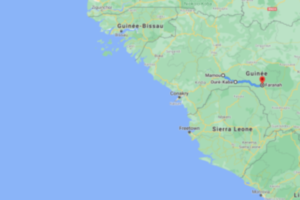Illegal logging and timber trades are major threats to ecosystems across West Africa. In Guinea, an organized crime syndicate has been illegally cutting and transferring protected wood species to neighboring Sierra Leone for years. From there, the wood is sent to Asia.
One of the most commonly traded timber species is African rosewood. This tree plays a critical role in preventing desertification of arid areas. The rapid and unsustainable exploitation of this slow-growing species to meet the demand for furniture in Asia will therefore leave large areas extremely vulnerable to desertification. African rosewood is classified as Endangered on the IUCN Red List and is listed in CITES Appendix II.
While there is an intense amount of illegal logging and timber trafficking between Guinea and Sierra Leone, efforts led by the Guinean Ministry of Environment, Water, and Forests (MEWF) to combat illegal trade are nevertheless bearing fruit. Born Free USA is honored to be part of these efforts by providing officials with resources and knowledge through our law enforcement training programs and our posters to raise public awareness about the illegal trade in timber (page 8).
On the night of May 11-12, 2021, a Water and Forests inspector of Faranah explained that he had sent agents to the field after receiving information of illegal activity. At around 2:00 AM, three trucks full of African rosewood on their way to Sierra Leone were seized on the Faranah-Mamou national road.
Timber trafficking is a lucrative crime in Guinea, with one log fetching up to 900,000 Guinea francs (USD 100) in the capital city, Conakry, prompting people to take part in the trade despite the risks. In the Mamou area, forest guards have now been suspended by the MEWF for their suspected involvement in illegal logging and timber trafficking. Guinea’s President, Alpha Conde, announced that further arrests are planned and stated that, “all those found to be responsible or complicit will receive administrative disciplinary sanctions and will be subject to legal proceedings.”
The alleged traffickers were arrested, interrogated, and then placed under a detention order. Colonel Layaly Camara, Director of National Directorate of Water and Forests, confirmed that traffickers who were arrested were fully aware that they were illegally trafficking timber without any official documents.

“According to Article 173 of the Forestry Code, perpetrators face payment of 50,000,000 Guinea francs (5,000 USD) to 250,000,000 Guinea francs (25,000 USD) and risk imprisonment for six months to two years or one of the two penalties only,” Colonel Layaly explained. “The wood will be sold and the money will be used for reforestation.” On June 14, 2021, the MEWF decided to prohibit timber cutting and transportation throughout the country until further notice.
View Photos of the Seizure (Website in French)
Trafic illicite de bois vers la Sierra Léone : d’importants dépôts découverts encore à Mamou
Born Free USA congratulates the Guinean government for its successful enforcement efforts and remains committed to supporting West African governments in their fight against illegal trade!
Keep Wildlife in the Wild,
Aurora
